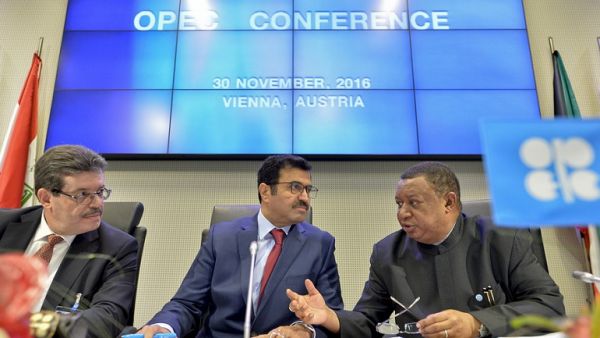UAE Energy Minister Suhail Al Mazroui on Tuesday expressed optimism about securing an extension of Opec’s production cuts, but the same cannot be said about the Saudis.
“We are looking forward to an agreement but I cannot tell what level of consensus [there is]. We will be talking to different ministers and I am personally optimistic about reaching an agreement,” said Al Mazroui, adding that Opec always looks at various scenarios.
Related stories:
- 5 Reasons Why Oil Prices Are Soaring (No, It's Not The Saudi Arrests)
- African Country Emerges As New Oil Player, With 1 Billion Barrels Capacity
Al Mazroui was speaking to reporters on the sidelines of the Gulf Petrochemicals and Chemicals Association (GPCA) forum in Dubai on Tuesday.
He also said the market is in a much better situation than it was last year due to the commitment and compliance of Opec and non-Opec members.
“We are looking for another year of correction and recovery. Opec countries and the UAE, they are all committed to fix the issue of five years of [surplus]. We feel that time should be given to the market for a full recovery. We are looking for the consensus when we meet.”
When asked whether Russia is on board concerning the extension, Al Mazroui said he could not comment on any other country’s position before the meeting.
Related stories:
- Brent Oil Prices To Average $54 Per Barrel In 2017, $56 In 2018: Experts
- Russia Could Be The World's Next Energy Superpower, Says Report
Meanwhile, Saudi Arabia energy minister Khalid Al Falih said on Tuesday it is too soon to say anything on the extension of the agreement by Opec member countries.
“Let’s wait till November 30. Opec meetings are never straight-forward meetings. We will debate the options and come up with a decision,” he told reporters at the same forum.
He also said the meeting would hear everyone and reach a solution benefiting both producers and consumers.
Opec countries, together with other non-Opec producers like Russia, are cutting output by about 1.8 million barrels a day to prop up oil prices.
The agreement which came into effect in January this year was initially set to expire in June. However, it was extended up to March 2018 to allow oil markets to rebalance.
Oil-producing countries will meet in Vienna on November 30 to take a decision on future policy.
Prices slipped on Tuesday in early trading amid uncertainty over a possible extension of output cuts by major oil producers, as well as expectations of higher supply due to a restart of the Keystone pipeline from Canada to the United States.
Related stories:
- Oil Will Remain World’s Most Important Energy Source Until 2040: Opec World Oil Outlook
- Opec Appoints Saudi Al-Qahtani As New Director Of Research
Brent, the global benchmark was trading at $63.23 (Dh232.24) per barrel, down by 0.61 per cent, at 2.07pm UAE time whereas West Texas Intermediate, the US crude, was down by 0.98 per cent at $57.54 per barrel.
US crude hit a two-year high last week due to the shutdown of a major oil pipeline from Canada to the United States.
While Opec is expected to seek an extension of the curbs, there are doubts whether Russia will support the decision, according to analysts.
By Fareed Rahman








